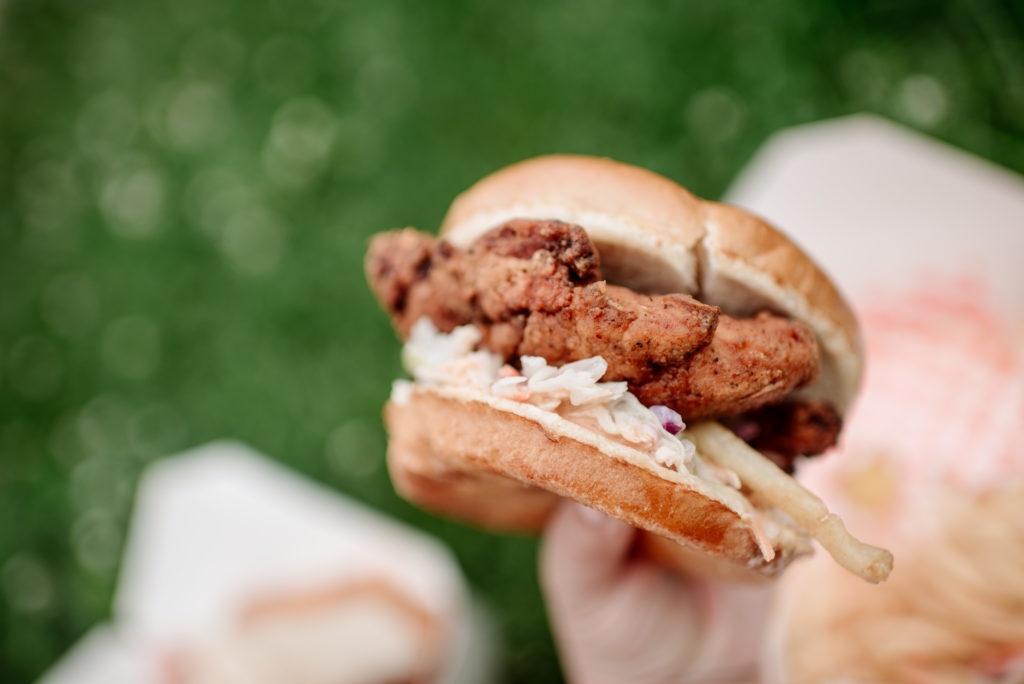PHOTOS BY VICTORIA CAMPBELL / FOOD PHOTOS BY BECCA DILLEY PHOTOGRAPHY
![]() What do a fire emoji, a chicken emoji, and a heart emoji have in common? They’re the signature symbols of Nashville Coop, the Twin Cities hot chicken business that has exploded from two food trucks to a brick-and-mortar restaurant in just five months. Yes, they started a thriving business during a pandemic; yes, they’re all over social media; and yes, their chicken is darn tasty. Their new shop is at 300 Snelling Avenue South in St. Paul, and they’ll be taking online orders for curbside pick-up for the foreseeable future.
What do a fire emoji, a chicken emoji, and a heart emoji have in common? They’re the signature symbols of Nashville Coop, the Twin Cities hot chicken business that has exploded from two food trucks to a brick-and-mortar restaurant in just five months. Yes, they started a thriving business during a pandemic; yes, they’re all over social media; and yes, their chicken is darn tasty. Their new shop is at 300 Snelling Avenue South in St. Paul, and they’ll be taking online orders for curbside pick-up for the foreseeable future.
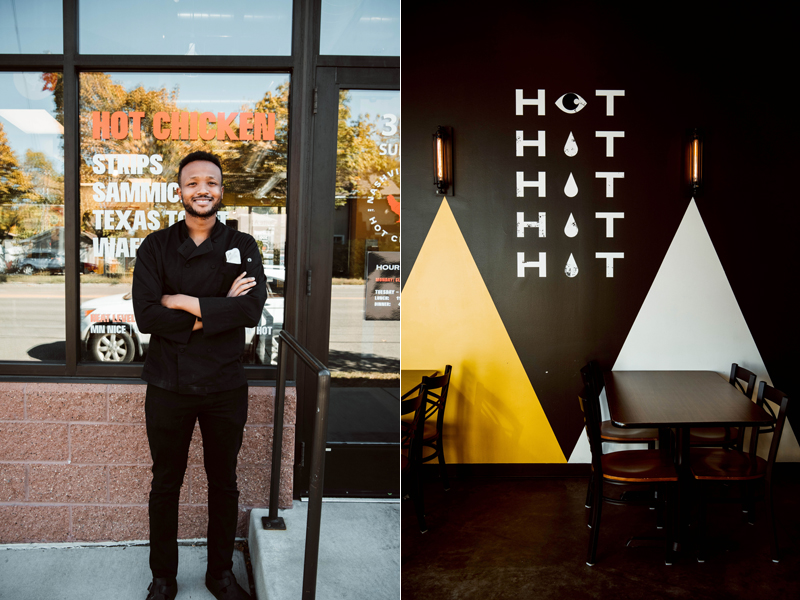 “My parents are leading the charge,” Kamal Mohamed (above) says about his father, Mohamed Omer, and his mother, Nasra Omer. He says Mr. Omer is the chairman/CEO of Nashville Coop, and his mom is the head chef. “Growing up,” he says, “we rarely went out to eat — not because we couldn’t, but because the food that she made, it always felt like it was better.” He and his brother, Arif Mohamed, are the general managers and social media pros.
“My parents are leading the charge,” Kamal Mohamed (above) says about his father, Mohamed Omer, and his mother, Nasra Omer. He says Mr. Omer is the chairman/CEO of Nashville Coop, and his mom is the head chef. “Growing up,” he says, “we rarely went out to eat — not because we couldn’t, but because the food that she made, it always felt like it was better.” He and his brother, Arif Mohamed, are the general managers and social media pros.
The Mohameds grew up eating their mom’s sugo and pasta, a dish that made its way to Ethiopia after Italy began colonizing East Africa in the late 1800s. Having moved to the U.S. around the turn of the millennium, Kamal Mohamed says his mom’s cooking has “Middle East influences; Italian influences; African influences.” In fact, Nashville Coop’s recipe includes spices typical in Ethiopian cooking.
That’s key, because the essence of Nashville hot chicken is the rub, according to Jerrod Woods, a Minneapolis marketing manager who lived in Nashville from 2013-2017. He says, “Whatever magical seasoning they put in it — a lot of cayenne, I’m sure — that’s what it comes down to that makes it so good. A lot of places use lard to make the rub stick. And then the bread and the pickles are key.” At Prince’s, the Nashville birthplace of hot chicken, you can order various chicken pieces, from breasts to wings.
At Nashville Coop, if you want a full meal, you’re getting boneless, white-meat chicken strips no matter what. But you get to pick how they’re packaged and how much heat they hold. First, choose from “Strips” ($12), “Sammich” ($13), or “Texas Toast” ($13). My advice is to go for a “Sammich,” which comes on an excellent brioche bun with slaw and Coop sauce (seasoned mayo) — plus fries, pickles, and an extra strip on the side. Next, pick your spice level: Minnesota Nice (no heat), Coop (mild), Growlin’ (hot), or Cluckin’ Hot (“24-hour pain”).
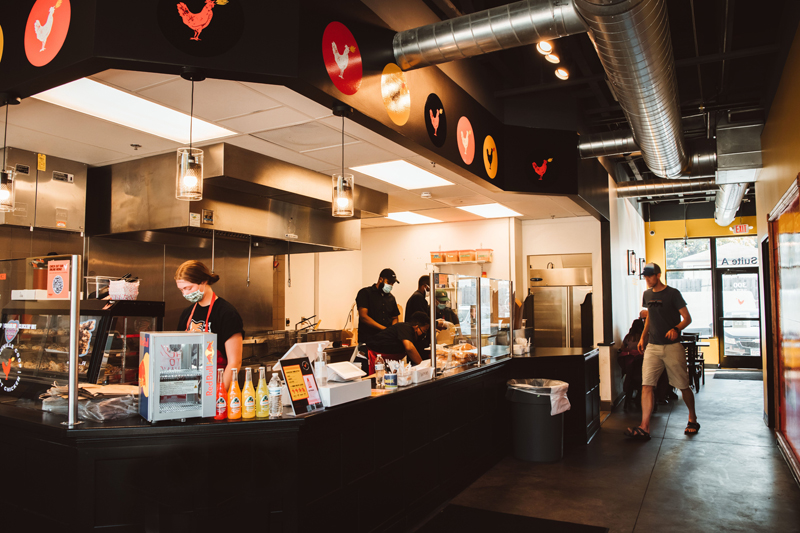 I recently stopped by a Coop truck with my friend Sara, who sees spice as a dare. She ordered the “Cluckin’ Hot” on Texas Toast, and the cashier dinged a call bell a few times in celebration. Upon opening her order, Sara inspected the chicken and narrowed her eyes, saying, “The dust does burn, but it’s not horrifying.” She started sniffling soon after her first bites but had no problem powering through. Emboldened, I asked for a half a strip. “Your eyes are watering,” Sara informed me a couple minutes later. I blinked and nodded, my mouth paralyzed by the burn.
I recently stopped by a Coop truck with my friend Sara, who sees spice as a dare. She ordered the “Cluckin’ Hot” on Texas Toast, and the cashier dinged a call bell a few times in celebration. Upon opening her order, Sara inspected the chicken and narrowed her eyes, saying, “The dust does burn, but it’s not horrifying.” She started sniffling soon after her first bites but had no problem powering through. Emboldened, I asked for a half a strip. “Your eyes are watering,” Sara informed me a couple minutes later. I blinked and nodded, my mouth paralyzed by the burn.
The chicken is definitely tasty, but a question stuck with me a few days later: Why is the seasoning more of a dry “dust,” like Sara noticed, instead of the more typical Nashvillian spicy glaze? It may have something to do with the lack of lard; instead of animal fat, each chicken strip gets dipped in melted butter before meeting the rub.
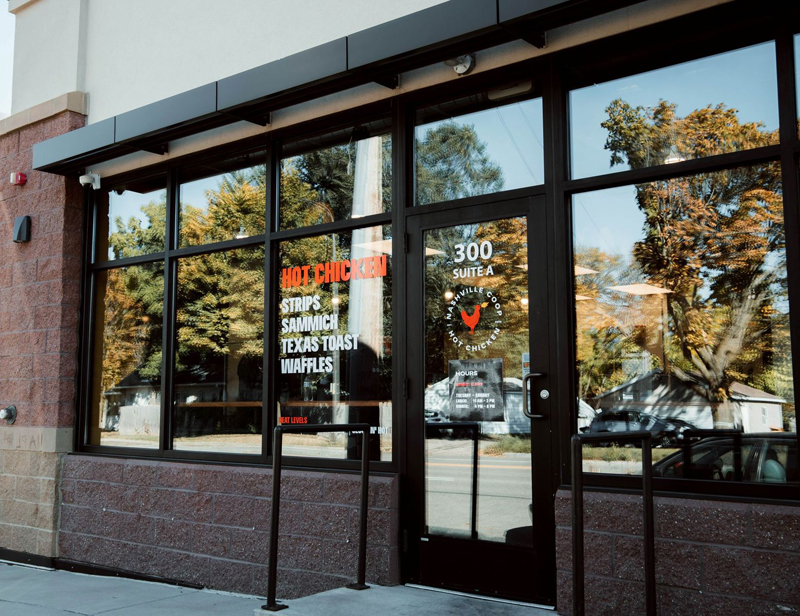 In past years, location has been key for anyone in the food truck game. If you played trivia at a certain brewery or attended a community event, there’s a good chance you’d have ordered from whatever food truck happened to be parked nearby. But during the pandemic, Nashville Coop has become a destination in itself. They do have regulars, especially those seeking heat. “The people who get the Cluckin’ — you know them by name,” Mohamed says. “When we come to their neighborhood, they show up. We know exactly their order.”
In past years, location has been key for anyone in the food truck game. If you played trivia at a certain brewery or attended a community event, there’s a good chance you’d have ordered from whatever food truck happened to be parked nearby. But during the pandemic, Nashville Coop has become a destination in itself. They do have regulars, especially those seeking heat. “The people who get the Cluckin’ — you know them by name,” Mohamed says. “When we come to their neighborhood, they show up. We know exactly their order.”
The Mohamed brothers’ social media presence (@nashvillecoop) has helped facilitate that connection. Their feed is always full of location updates and chicken pics — and as I told Kamal, the account’s constant activity would feel exhausting if its posts weren’t so tantalizing and upbeat. “When we don’t post,” he said, “that’s when our DM just fills up [with questions]. So we figure that if someone’s following us, they want this information.” The other part of their social strategy is engaging with their loyal customers: “If they share something, we’ll reshare it and maybe give them some heat back, maybe a cheeky [response]. And they’ll reshare that.”
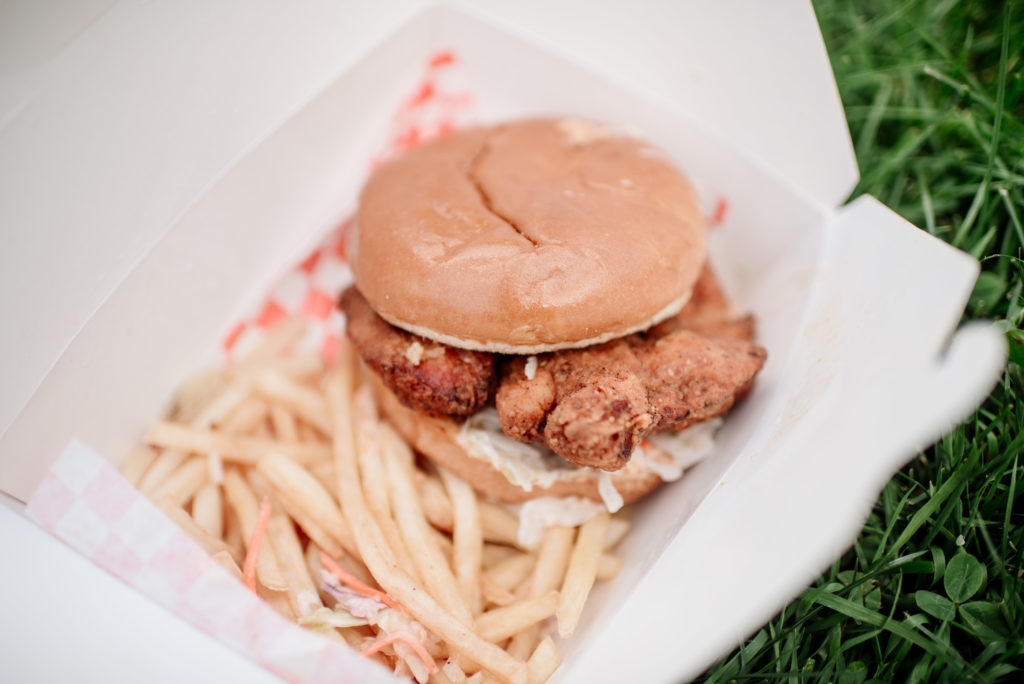 One of the @nashvillecoop feed’s toughest jobs is communicating when the Coop sells out for the day, an event that sparks mixed feelings for Mohamed. “It’s good from a perspective of, OK, we’re getting a signal that we should grow in order to meet demand. And then obviously, we are disappointed when we can’t give a customer what they wanted. We’ve gotten DMs of people saying, ‘OK, I guess I gotta settle for Raising Cane’s now,’ and it’s kinda funny, but at the same time, that’s [clearly] a business loss. At some point, you need that signal to grow, and that’s why we’re opening up the restaurant.”
One of the @nashvillecoop feed’s toughest jobs is communicating when the Coop sells out for the day, an event that sparks mixed feelings for Mohamed. “It’s good from a perspective of, OK, we’re getting a signal that we should grow in order to meet demand. And then obviously, we are disappointed when we can’t give a customer what they wanted. We’ve gotten DMs of people saying, ‘OK, I guess I gotta settle for Raising Cane’s now,’ and it’s kinda funny, but at the same time, that’s [clearly] a business loss. At some point, you need that signal to grow, and that’s why we’re opening up the restaurant.”
In part, the trucks have been selling out because of physical capacity — you can only stuff so much chicken inside a vehicle — but they’re also dealing with supply chain issues. Nashville Coop gets their chicken from a variety of farms: some in California, some in the Midwest. But according to Mohamed, circumstances related to COVID-19 have caused a national chicken shortage. “Prices are going up, and supplies are not [what they were],” he says. “So that also affects our supply and how much we can have in stock for that week.”
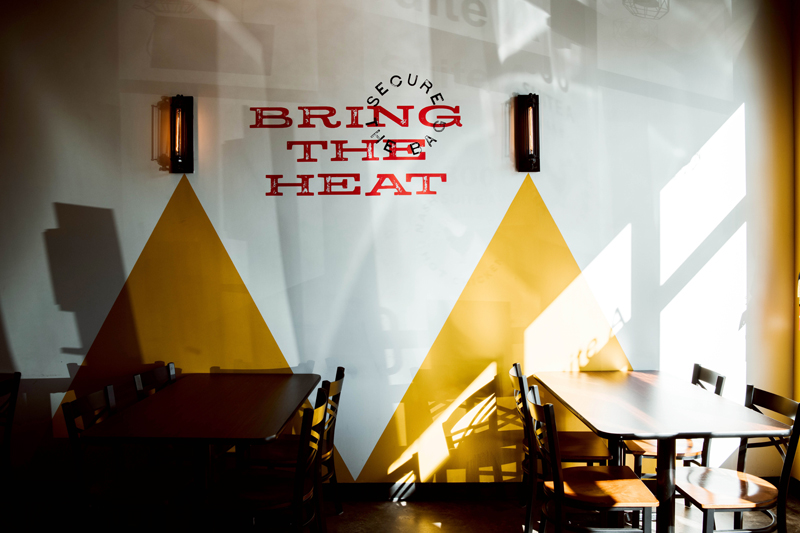 Even as they continue to expand, don’t expect Nashville Coop to introduce beer or wine to their menu. Mohamed says his family is culturally “against alcohol,” and they can’t and won’t take any revenue from alcohol sales. But what they could do is partner with a brewery — Mohamed could even see one opening up next door to the restaurant. “When we go to breweries, our sales are usually up 33 percent relative to that day,” he says. “I think a lot of our customers would like us to have that option, and so we’re trying to figure out ways where we can adhere to our principles and, at the same time, make sure our customers can get what they need.”
Even as they continue to expand, don’t expect Nashville Coop to introduce beer or wine to their menu. Mohamed says his family is culturally “against alcohol,” and they can’t and won’t take any revenue from alcohol sales. But what they could do is partner with a brewery — Mohamed could even see one opening up next door to the restaurant. “When we go to breweries, our sales are usually up 33 percent relative to that day,” he says. “I think a lot of our customers would like us to have that option, and so we’re trying to figure out ways where we can adhere to our principles and, at the same time, make sure our customers can get what they need.”
The last several months have been wild for the Omer-Mohamed family, but they’re in it together. Back in April, Mohamed remembers, “I had been [living outside Minnesota] for eight years, and my brother and I were shoulder-to-shoulder on the truck. We were arguing about something. And I remember that moment, like, ‘There’s going to come a time in the next few months where we’re not gonna be able to work on a food truck together, because we see this thing growing.’” Later, he continues, “You just feel like the world is all going to hell in a handbasket, but it’s not true. I think picking one or two things that you really care about and focusing on that — you know, we [think that] being a Black family that’s starting a business during COVID is a sign of protest, is a sign of activism. So we want to go beyond just looking at the issues and say, ‘How can we build these new platforms and new tables moving forward?'”

